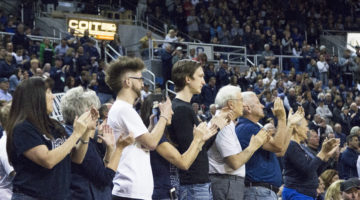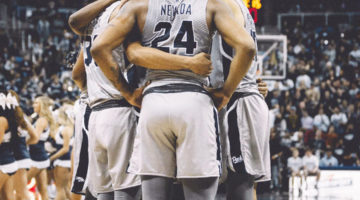
Photo courtesy of Butler athletics
Gordon Hayward heaves a mid-court shot at the buzzer in the 2010 national championship against Duke.
by Jack Rieger
Americans are addicted to three things: football, alcohol and underdogs.
Our fascination with the underdog role is sort of predictable; they embody the “American Dream” idealogy that claims with hard work and an optimistic attitude, every opponent is beatable and every goal is attainable.
Sports fans are especially consumed by the idea of an underdog, which has become the theme of nearly every sports movie for the past 30 years. “We are Marshall,” “Rudy,” “Hoosiers,” “The Bad News Bears,” “Miracle,” “Rocky” and “Cinderella Man” all share the same basic storyline: A team or individual faced with seemingly insurmountable odds somehow defeats their opponent (probably played by Willem Dafoe) and leaves the audience feeling inspired and satisfied. Here lies the problem; this almost never happens in the actual sports world. All you need is access to Wikipedia to realize that most sports leagues are dominated by a few powerhouses and that underdogs are more fantasy than reality.
Let’s take college basketball, for example, which glorifies the underdog more than any other American sport. Every year, college basketball networks sell fans on the idea that there is a sleeper team in the field with a realistic chance of winning the NCAA tournament, but nothing could be further from the truth. Four teams have dominated college basketball for the past quarter century: Duke, North Carolina, Kentucky and Connecticut. In the past 25 seasons, those four teams alone have combined for 15 championships. Only one mid-major school has won a championship in the last 38 years — UNLV in 1990. Underdogs are essentially irrelevant in college hoops.
Despite having fewer teams and a more level playing field, the NBA is even less accommodating to underdogs than college basketball. In the past 32 NBA seasons, only nine teams have won an NBA title, with the Bulls and Lakers combining for 18 of those 32 championships. Even more interesting — since 1999, either LeBron James, Kobe Bryant, Tim Duncan or Dwyane Wade has played in every finals series, meaning the NBA has been dominated by four players for the past 16 years. Yes, there are occasional upsets. In 2011, the Dallas Mavericks upset James and the Miami Heat, and in 2004, the Detroit Pistons surprised the Lakers, but those instances are few and far between.
College football has historically never been kind to underdogs either, although one of the most celebrated sports movies of all time, “Rudy,” tells the story of a short, chunky kid who lobbies his way onto the Notre Dame football team and eventually gets to play a few snaps in a meaningless game against Georgia Tech. Joe Montana, a freshman quarterback for Notre Dame during Rudy’s senior year, claims that much of the movie was either fabricated or completely made up, including the scene where members of the team laid their jerseys on the coach’s desk in support of Rudy. If a young Rudy Ruettiger tried to walk onto the team today, Brian Kelly would laugh Ruettiger all the way to the parking lot, and might offer him a position as the team’s water boy, although he may be a little undersized for that.
Similar to college basketball, college football has been dominated by a handful of schools for the past 20 years. Alabama, Southern California, Louisiana State, Ohio State and Florida have combined for 11 of the last 16 national championships. For seven out of the last nine years, the national champion has resided in Alabama or Florida, where the best athletes in the country play their high school and college football. A mid-major school hasn’t won a national championship since 1984, when BYU went undefeated and finished the season as the consensus No. 1 team. If you don’t play in Alabama, Florida, California or Ohio, your university has a better chance of discovering the cure for cancer than they do of winning the national championship.
Sports fans don’t like to admit it, but underdogs are almost irrelevant in major sports. Occasionally, an overlooked team will make a Cinderella run and flirt with a championship like Butler basketball in 2010 and 2011, only to lose to Duke and Connecticut. And by the way, there’s no shame in not winning a national championship; it’s incredibly difficult to accomplish. Charles Barkley never won an NBA finals and he’s considered a top-20 player of all time. Leonardo DiCaprio has never won an Oscar, but that doesn’t define his ability as an actor. Championships are not the only metric for success; you can achieve greatness without hoisting a trophy.
Underdogs will always hold a special place in American hearts because they personify the rags-to-riches narrative; with hard work and the occasional stroke of luck, every Goliath is vulnerable. But in the world of sports, David hasn’t won in a very long time.
Jack Rieger can be reached at jrieger@sagebrush.unr.edu or on Twitter @JackRieger.












